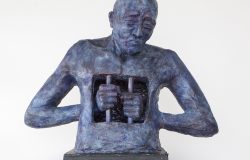I must have been about nine or ten years old when I encountered the word “ochre”. I didn’t know what it meant and I must have read it in a sentence something along the lines of, ‘The leaves on the tree had turned ochre.’ I remember looking up the word to make sense of it and probably found a definition along the lines of, ‘An earthy pigment containing ferric oxide typically with clay, varying from light yellow to brown or red.’ My confusion would have expanded further, when trying to understand how to pronounce the word I would have found a phonetic representation like: ‘əʊkə’. I was stumped. I don’t know why I didn’t ask a teacher for help, instead I chose to remain frustrated by my ignorance.
It’s hard to find, or ask, the meaning of something when you don’t know how to express what you need to know. What we can’t put into words stays unexpressed, but remains within us, none-the-less, niggling for resolution.
There are times in our lives when it is difficult to make sense of why things are happening to us. We would like to think we are all inoculated from troubles, but from time to time we feel beset by woes. What is going on? Why does our life need this disruption, oftentimes delivered with harsh and what appears to be violent ruthlessness. It is as though the ecosystem of our lives is rebelling and sorrows and frustrations come in battalions.
In Buddhism, Manjushri is an enlightened one in service of all sentient beings. He carries with him a flaming sword in his right hand which symbolises his ability to cut through delusion. Close to his heart, in his left hand, he holds the stem of a lotus flower which carries a book – the Perfection of Wisdom. This book contains the insights that describe the indescribable nature of reality. Manjushri is often depicted as a beautiful young prince and his flaming sword is not a literal sword but a metaphor for how life will cut through the chains that bind us to our endless cycle of delusion and suffering. His youthfulness represents the eternal freshness and spontaneity with which an enlightened mind approaches life.
Transformation has its own timeline and process. Intervention against this process is futile. Sometimes being still and allowing the true meaning to arise takes the greatest courage and patience. We have to trust the process of life and let Manjushri’s flaming sword cut through our fetters and release us from our anchored thoughts, allowing life to navigate each of us to our next harbour whether docking there was our intention or not. We seldom get to choose the place and times by which Manjushri can enter into our lives. It’s not as if life were an à la carte meal prepared for us by Michelin starred chefs. When it comes to our mental and spiritual growth, we can’t always choose what we’d like to consume.
A change of consciousness calls for a re-wiring of our brains. All those connections and patterns that once signified something may no longer have relevance. The meaning we found in one way of being dissolves like a pillar of salt in the rain. Gradually the scaffolding that we had built our lives around collapses. Things come undone.
Now here’s the beauty of life. The term ‘mutual arising’ also resides in Buddhist philosophy. It describes the the spontaneous uprising of troublesome things with its counterpart remedy. Everything is working in perfect harmony. Life, it would seem, is filled with serendipity, and fortunate surprises abound in equal proportion to the ‘bad luck’ we bemoan has fallen to us.
Back when I was nine or ten and befuddled by this word ‘ochre’ I found myself jealously eyeing a beautiful set of colouring pencils. A girl in my class had travelled to some foreign land and returned with this set of 36 coloured pencils. They were encased in a metal tray and the colours ran through all the hues of our spectrum. I moved in closer to see the crayons the girl had smugly displayed for her classmates to envy. Impressed in gold writing on each pencil were the brand name of the manufacturer and the name of the colour of the pencil. There was a light purple one called ‘Lavender’ and a beautiful blue one called ‘Lapis lazuli’. And then I saw it, the burnt orange colour called ‘Ochre’. And I got it! I understood what ochre meant. The sentence made senses, the definition made sense. An awakening occurred.
Waiting for life to reveal its answers is the way to go. Instead of rushing in to say this bad thing has happened, more good things are due to come my way; its probably more beneficial to give Manjushri all the time he needs to break us free from our limiting beliefs and ‘old patterns’ of being. Enlightenment lurks within our lamented losses and frustrations. Remember that life is happening for us; not to us. The answers we seek are arising simultaneously to the questions we ask. We should take care of the questions we ask of life because Manjushri ensures we get the right answers.






